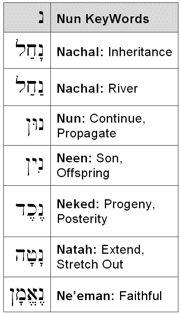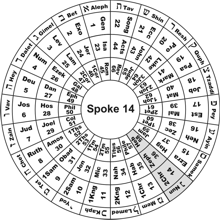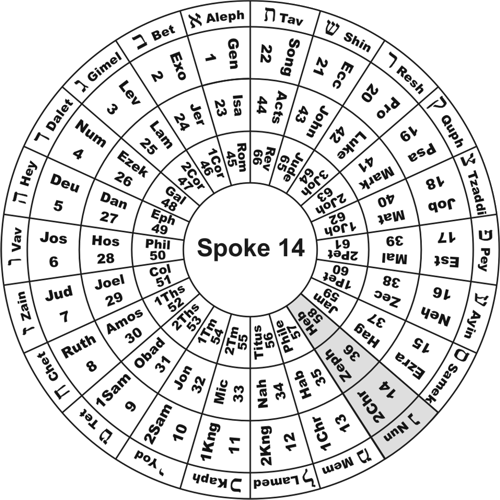Jesus Christ: High Priest and Heir of All Things
God, who at sundry times and in divers manners spake in time past unto the fathers
by the prophets, Hath in these last days spoken unto us by his Son, whom
he hath appointed heir of all things, by whom also he made the worlds;
Who being the brightness of his glory, and the express image of his person, and upholding all
things by the word of his power, when he had by himself purged our sins, sat down
on the right hand of the Majesty on high; Being made so much better than the angels, as he hath
by inheritance obtained a more excellent name than they.
Hebrews 1:1ff (Spoke 14, Cycle 3)
 The
opening passage of Hebrews reveals Jesus Christ as the Son of God and heir of all things who has received
His exalted name by inheritance. This links to the primary Nun KeyWord nachal that God
used in AV Psalm 119:111. The importance of this KeyWord, and its relation to the Jewish concept of the
Messiah, is common knowledge amongst rabbinic scholars. Rabbi Ginsburg set it prominently in
the title of his chapter The
opening passage of Hebrews reveals Jesus Christ as the Son of God and heir of all things who has received
His exalted name by inheritance. This links to the primary Nun KeyWord nachal that God
used in AV Psalm 119:111. The importance of this KeyWord, and its relation to the Jewish concept of the
Messiah, is common knowledge amongst rabbinic scholars. Rabbi Ginsburg set it prominently in
the title of his chapter  on the letter
Nun, "The Messiah – Heir to the Throne," and subtitled it with the "Yinon" quote from Psalm 72:17 (BW book
pg 271). If I did not know that he was drawing these ideas from the ancient
rabbinic tradition, I easily could have thought that he derived them from the structure of the Christian Bible! on the letter
Nun, "The Messiah – Heir to the Throne," and subtitled it with the "Yinon" quote from Psalm 72:17 (BW book
pg 271). If I did not know that he was drawing these ideas from the ancient
rabbinic tradition, I easily could have thought that he derived them from the structure of the Christian Bible!
The Book of Hebrews contains over a quarter of all occurrences of the words heir,
inherit, and inheritance found in the Epistles on Cycle 3. They span the whole Book, being found in
five chapters (1, 6, 9, 11, 12). A few samples of characteristic verses should make God's intent clear.
This theme also links to the root meaning of Nun as a symbol of continuance, faithfulness, immutability, and eternality:
- Hebrews 6:11f And we desire that every one of you do shew the same diligence to the full assurance of hope unto the end:
That ye be not slothful, but followers of them who through faith and patience inherit the promises.
- Hebrews 6:17 Wherein God, willing more abundantly to shew unto the heirs of promise the immutability of his counsel, confirmed it by an oath:
- Hebrews 9:15 And for this cause he is the mediator of the new testament, that by means of death, for the
redemption of the transgressions that were under the first testament, they which are called might
receive the promise of eternal inheritance.
- Hebrews 11:7 By faith Noah, being warned of God of things not seen as yet, moved with fear,
prepared an ark to the saving of his house; by the which he condemned the world, and became
heir of the righteousness which is by faith. By faith Abraham, when he was called to go
out into a place which he should after receive for an inheritance, obeyed; and he went out,
not knowing whither he went. By faith he sojourned in the land of promise, as in a strange country, dwelling in
tabernacles with Isaac and Jacob, the heirs with him of the same promise:
The last quote, spanning three verses from the great Faith Hall of Fame of Hebrews 11 (BW book pg 284), is based on the
fundamental Nun KeyWord ne’eman (faithful). Again, we are witnessing the endless beauty of
this Divine tapestry. The reference to the "land of promise" further amplifies the connection between Nun and Inheritance,
for it was Joshua Ben Nun (Son of Nun) who caused Israel to inherit the Promised Land (Deut 1:38, pg 117).
His title forms the acronym Bet Nun and so spells the Hebrew word Ben (Son)
(BW book pg 136). He is a great type of
the Son of God, who also bears the name Joshua (the Hebrew equivalent of Jesus), and who caused us to
enter into our eternal inheritance of heaven (Heb 9:15). This is prophesied in the Second Psalm,
the Psalm of the Son,
the Second Person of the Holy Trinity:
I will declare the decree: the LORD hath said unto me, Thou art my Son; this day
have I begotten thee. Ask of me, and I shall give thee the heathen for thine inheritance (nachal)
and the uttermost parts of the earth for thy possession.
Psalm 2:7
The Son (Ben) is Heir (Nun) of the House (Bet). These ideas define an essential aspect the Biblical
meaning of the word son. The letters combine to form a lucid Hebrew Word Picture of the Son.
Hebrews quotes this verse twice (Heb 1:5, 5:5).
Next article: A Priest Forever after the Order of Melchizedek
|



